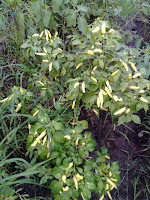Rethinking Organic Farming in Sumba
Tuesday, 12 June 2018by adminstube
Organic farming is nature harmony agriculture having balanced relationship between human and nature, that people maintainthe natural habits and use natural methods in processing agricultural land so that the environment remains sustainable and the ecosystem balance continues to be maintained.
 In the southern part of Indonesia which stretches as tropical savannah with an area of 7.000,5 km2, that is the island of Sumba. The mainland of Sumba is a living place for Sumbanese and various other tribes with diverse cultural and religious backgrounds as well as agricultural and livestocks as a support for the economic of the region. Sumba island consists of four districts, namely East Sumba, Central Sumba, West Sumba and Southwest Sumba, with their own uniqueness, for example East Sumba has a vast agricultural area that can be cultivated by its inhabitants to produce food in a natural way without using chemicals. Basically, farming in Sumba is still natural because it depends on the season, which the dry season is longer than rainy, so agricultural processing is only done when the rainy season approaching. When the dry season the agriculture land becomes grazing field for livestocks. Agricultural land rests and even gets fertilizer from animal waste which increases soil nutrients.
In the southern part of Indonesia which stretches as tropical savannah with an area of 7.000,5 km2, that is the island of Sumba. The mainland of Sumba is a living place for Sumbanese and various other tribes with diverse cultural and religious backgrounds as well as agricultural and livestocks as a support for the economic of the region. Sumba island consists of four districts, namely East Sumba, Central Sumba, West Sumba and Southwest Sumba, with their own uniqueness, for example East Sumba has a vast agricultural area that can be cultivated by its inhabitants to produce food in a natural way without using chemicals. Basically, farming in Sumba is still natural because it depends on the season, which the dry season is longer than rainy, so agricultural processing is only done when the rainy season approaching. When the dry season the agriculture land becomes grazing field for livestocks. Agricultural land rests and even gets fertilizer from animal waste which increases soil nutrients.
How is the opportunities for organic farming in Sumba?
The area of agricultural land in East Sumba is around 8.358.00 Ha, based on the data of National Statistical Institute (BPS)2014. It shows that the opportunity for organic farming in East Sumba can be the modal for competing in local and national markets. The commodities for local markets arevegetables, tubers, and nuts. While commodities for national markets are cashews, cotton, areca nut, coffee and chocolate.Unluckily the agriculture products are sold as raw material, not processed into derivative products yet. It impacts on low income and lackness of innovation capability of farmers. The existence of traditional farmers who farm naturally should be maintained and even assisted with knowledge and skills of utilizing local materials as organic fertilizers and pesticides to improve the quality of crops and harvests. This is the duty of every stakeholders who competent in agriculture to carry out these tasks, although in general it is all Sumbanese’s responsibility.
How is the interest of Sumba young people in agriculture?
 The influence of modernization has reached Sumba including its youth. Most of them are not longer interested to be farmers. They prefer to work as civil servants or company employees because they are considered more elite. There is an assumption that becoming farmer can reduce prestige and desire to earn money without waiting or processing such as farming from cultivating land, caring for crops until harvesting time. This is not entirely wrong because agriculture is considered not prospective. It needs efforts to raise awareness and view of young people on agriculture by showing the prospects of agriculture, as experienced by Frans Fredi and Aloysius, two young Sumba youth who dare to start organic farming in Lambanapu area, East Sumba. Hopefully the actions of these two young people can awaken the movement of young people to love organic farming in Sumba.
The influence of modernization has reached Sumba including its youth. Most of them are not longer interested to be farmers. They prefer to work as civil servants or company employees because they are considered more elite. There is an assumption that becoming farmer can reduce prestige and desire to earn money without waiting or processing such as farming from cultivating land, caring for crops until harvesting time. This is not entirely wrong because agriculture is considered not prospective. It needs efforts to raise awareness and view of young people on agriculture by showing the prospects of agriculture, as experienced by Frans Fredi and Aloysius, two young Sumba youth who dare to start organic farming in Lambanapu area, East Sumba. Hopefully the actions of these two young people can awaken the movement of young people to love organic farming in Sumba.
It should be admitted that the application of organic farming require synergy from local governments as policy makers, agricultural agency as arm of government that accompany farmers, community organizations as counterweight and farmers who cultivate the land. In the future, an optimistic attitude, willingness to learn and common goals need to be possessed, so organic farming in East Sumba will develop and compete in the national market. Hopefully. (Yanto Umbu Muri).












